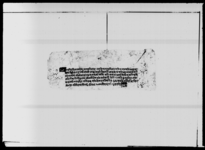A portion of the Mulukī Ain prescribing punishment for a certain breach of sexual relations within a family except for Limbus and Kirātīs (n.d.)
ID: E_2782_0042
Edited and
translated by Julia Meckl
Created: 2019-12-18;
Last modified: 2022-02-28
For the metadata of the document, click here
The accompanying edition, translation/synopsis and/or commentary are available under the terms of the Creative Commons Attribution-ShareAlike 4.0 International License
Abstract
This is a portion of the Mulukī Ain dealing with certain sexual relations within a family that are considered illicit for the general population but not for Limbus and Kiratīs.Diplomatic edition
[1r]
1⟪५६⟫[unknown seal] 1लिम्वुकिरातिजातवाहेक•तागाधारिजातरनमासिन्यामतुव़ालिजातमासिन्याजातपानिनचलन्या2छोयाछिटोहालनुपर्न्याजातलेआफ्नावावुलेविहागरिल्यायाकाकंन्याविधवाल्यायाकाजारि
3गरिल्यायाकाऐनलेजारहांनहुन्यासम्मका•स्वास्निसानिआमाहरूअर्कासितविग्र्याकाविग्र्याको
4जाहेरभैकरणिगरेछभन्याऐनवमोजिम्अंससर्वस्वगरितिलोग्न्यास्वास्निछुट्याइदिनु•एस्ता
5काहातकोभातचल्दैन•पानिचल्छपानिकोमात्रपतियादिनु•छुट्यायापछिपनिफेरिकरणिग
6र्योभन्या•जतिफेराकरणिगर्छउतिपल्ट१०।१०रूपैयादंडगरि•छुट्याइदिनु[unknown seal]
Translation
[1r]
561
Except for the Limbu and Kirātī jātas, if someone from a Sacred Thread-wearing, Non-enslavable Alcohol-drinking, Enslavable, Water-unacceptable or Untouchable caste has sexual intercourse2 with a co-wife ritually married to his own father or [with] a woman whom the father has taken as a concubine, whether as a virgin girl, a widow or [any category of] woman whose husband, according to the Ain3 , may, if she commits adultery, kill her paramour4 , and if [the woman] has acted wantonly before with another person of which [the son] is aware5 , this man (i.e. the son) and woman shall be separated after [the former’s] share of property is confiscated in accordance with the Ain. From the hand of such [people] cooked rice is not acceptable. Water is acceptable. Expiation (patiyā)6 shall be granted for water only. If he has sexual intercourse [with her] again, he shall be fined 10 rupees for each time, and they shall be separated [again].
Commentary
This document contains text found in a series of articles in the Mulukī Ain of 1854 that regulate incestuous relations. It is not clear why this passage appears as a single document. The text as it appears in the Mulukī Ain has been translated by Khatiwoda et al. (2021, see §124.5 for what corresponds to the present document). It grants the Limbu and Kirātī (Rāī) peoples of eastern Nepal exemption from prosecution for violating restrictions on sexual relations specified in the document, and in so doing presents an example of the strictures facing a Hindu marriage, the purity ideals promoted by the state, and the local customs of ethnic groups (cf. Stiller 1976: 174; Commentaries to DNA_0013_0069 and DNA_0014_0022). The existence of such an exemption suggests that among Limbus and Kirātīs it was a common practice for a son to have sexual relations with a co-wife of his father. Similarly, Vaidya and Manandhar describe the custom of taking an elder brother's wife as one's own, which was punishable by state law except for Limbus, Kirātīs, Lepchas, and the inhabitants of Jumlā (Vaidya and Manandhar 1985: 113). Furthermore, the document shows that the distinction between being married with full rights and being brought or taken (kaṁyā vidhavā lyāyākā = brought as a virgin or widow) had consequences only for the female gender (cf. Höfer 2004: 41)

